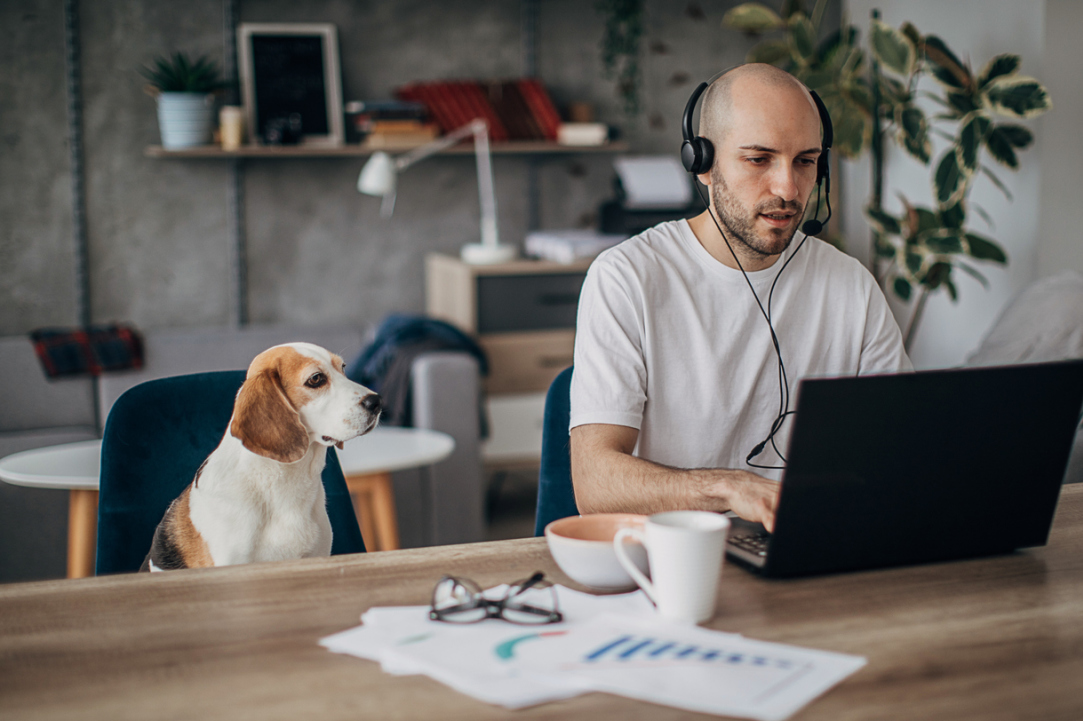The Psychosocial Risks of Distance Working

The project team ‘Regulatory framework to prevent remote work-related psychosocial risks’ of the HSE University Faculty of Law has held an interdisciplinary online workshop to discuss the possible psychosocial risks faced by telecommuters. Participants learned more about the preliminary results of a survey conducted among Russians in summer 2021. In addition, guest experts from French and German universities spoke about EU countries’ experiences in preventing psychosocial risks.
HSE University established the project team ‘Regulatory framework to prevent remote work-related psychosocial risks’ to study the psychosocial risks faced by people working remotely and to put forward ideas of how the legal framework can be improved to prevent such risks. The team includes representatives from the Institute of National and Comparative Legal Studies, the Biological Law Research Community of the School for Theory of Law and Cross-sectoral Legal Disciplines of the Faculty of Law, and the Master’s Programme in Pharmaceutical and Biotechnology Law. The open interdisciplinary workshop devoted to research into the psychosocial risks faced by remote workers was held online on September 27 with the participation of HSE researchers and guest experts.

Natalia Galkina, Deputy Director of the HSE Institute of National and Comparative Legal Studies, HSE Faculty of Law
‘We are all well aware of the fact that a healthy society relies on the mental and physical health of each individual. In our turbulent world, we’ve had to change things we were used to, including our work routine. We are holding this interdisciplinary workshop to look into the psychosocial risks faced by remote workers.'
Survey of Russian Workers
During the online workshop, the project team presented the preliminary findings of a survey conducted among telecommuters. The survey covered 149 respondents from Russia, mainly women aged 21–35. However, a large number of respondents were aged between 36 and 50 years old. The online poll took place in the summer and autumn of 2021.
‘We wanted to find out whether distance working affected stress levels in order to demonstrate the need for a special legal regulatory framework in this sphere,’ said Polina Malkova, project team expert, PhD, Research Fellow of the Institute of National and Comparative Legal Studies.
The respondents answered questions about their working status (whether or not they had a managerial position), the availability of a specially equipped workstation at home, the number of people in their household, etc. The researchers plan to use the results to find out which external working conditions affect the level of stress experienced by teleworkers. The majority of questions referred to the working process itself.

Polina Malkova, Research Fellow, Institute of National and Comparative Legal Studies
‘The first question was about the relationship between employees and their employers and peers. Very few of the respondents view online communication with their colleagues as a positive experience. This means that the majority of the respondents had difficulties communicating with their bosses and doing their usual daily tasks—communication was disrupted. We also found out that external noise and other distractions were the main difficulties faced by the respondents in their remote workplace. Although workloads remained the same for the majority of respondents, many people did have more work to do. This is something to bring to the regulator’s attention.’
The researchers also analyzed other psychosocial factors. According to the survey, the majority of respondents said that circumstances such as struggling to deal with the pandemic or feeling lonely had not significantly affected their stress levels. However, minor things can trigger stress. ‘For instance, one of the top stress factors among the respondents was difficulty keeping fit. Respondents also found it difficult to maintain a proper work-life balance. I think this is very useful information for researchers,’ said Polina Malkova.
Other sources of anxiety among the surveyed telecommuters included job insecurity due to the pandemic, fear of losing income, and insufficient assurances and a lack of feedback from employers.
‘We posed the direct question of whether the workers felt that they had enough support from their employers. The majority of the respondents (58%) did not feel that they had any,’ said Polina Malkova. ‘One of the last questions we asked was about health while working remotely. Although the majority said their health remained the same, a third of the respondents reported some health issues. In the final question, most of the respondents (60%) said that they would be willing to continue working remotely, 10% were unsure, 15% would prefer not to telecommute and 12% do not want to telecommute at all.’
All in all, the respondents were quite positive about their distance working experience and would like to continue teleworking. We do not see any significant increase in stress levels. However, some factors, including a lack of communication with colleagues and feedback from bosses, difficulty keeping fit, and insufficient support from employers, need to be analyzed in more detail
Elena Serebryakova, Head of the project team, PhD, and Associate Professor of the School for Theory of Law and Cross-sectoral Legal Disciplines, noted that most people outside Russia prefer to work remotely.
Society has evolved enough to be able to provide stress-free living for its people, rather than simply protect them from harm
Ekaterina Kashirskaya, PhD, Research Fellow of the School of Psychology at the HSE Faculty of Social Sciences, spoke about the importance of the survey, the nature of stress and methods to prevent it.
She highlighted that stress is part of our daily lives and is a typical response to change. When people are forced to work remotely, the loss of much-needed freedom and certainty can cause stress and anxiety. She also pointed out that it was not easy for many people to return to the office, as they had to readapt to working offline.
‘Coping with stress is a challenging psychological effort. During lockdown, people have been encouraged to do sports and learn foreign languages because they are thought to have more spare time. Meanwhile, everyone is suffering from anxiety caused by a fear of falling ill or difficulties communicating with colleagues. Those who have managed to cope with stress are the real winners, extra achievements aside,’ she said.
I keep reminding people that it is a real achievement simply to cope with stress and remain healthy after the distance working period. You don’t need any other achievements to be a hero
Ekaterina explained that continuous stress can cause psychosomatic illnesses and nervous disorders. ‘When we are confronted with stress, some deep processes—ancient from an evolutionary point of view—are triggered. Our mind is unable to control them. We get an adrenaline rush, our pulse quickens, our blood pressure increases, and more blood flows to our muscles. This triggers the fight-or-flight response. However, we can’t always fight or run away in our everyday lives and we often need to suppress our emotions. It is important to learn how to cope with these symptoms of stress. The best method is to do some physical exercise.’
European Experience
Guest experts from European universities spoke about how psychosocial risks were studied and prevented abroad.
Associate Professor Olga Chesalina, LL.M., Senior Researcher at the Max Planck Institute for Social Law and Social Policy, Department for Social Law, in Munich, Germany, shared experience from Germany. ‘Research shows that people are happy to work remotely. At the same time, only one in five German companies is planning to continue telecommuting.’ The expert also noted that remote work is a source of significant psychosocial risks for certain groups of employed people, including those with kids—especially mothers. Analyzing a study titled ‘The impact of teleworking and digital work on workers and society’ commissioned by the European Committee on Employment and Social Affairs (EMPL), she mentioned the so-called ‘autonomy paradox’.
On the one hand, telecommuters have more flexibility in planning their working hours compared to their peers working from the office. On the other hand, their work schedule is more intense, they experience more stress, and their work-life balance is in jeopardy. The report also focuses on how psychosocial risks are regulated in European laws, analyzing the right to disconnect from work, an important initiative brought up by the EU Parliament. Olga Chesalina summarized by saying that an interdisciplinary approach is required to prevent psychosocial risks, and that the necessity to assess psychosocial risks should become an express obligation of each employer under the German Labour Code.
Alain Benlezar, PhD in Economics and Politics, guest lecturer of the CY Cergy Paris University (Paris, France), and former Head of Air France Quality of Working Life, spoke about French experience in addressing the issue of psychosocial risks.
According to Mr. Benlezar, the French Labour Code expressly states that, in addition to physical protection for their personnel, employers must provide appropriate conditions for employees’ mental and physical wellbeing. Employers who fail to do so can be held civilly or even criminally liable. ‘This type of protection must be guaranteed irrespective of the working format,’ he said. ‘Remote work-related psychosocial risks are yet to be studied, and there have been hardly any discussions about how to prevent them. This is due to the fact that the number of remote workers is relatively small in France (25% of the total workforce).’

